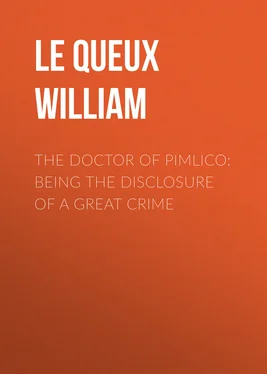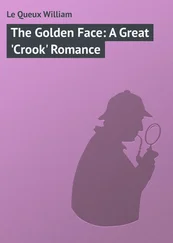William Le Queux - The Doctor of Pimlico - Being the Disclosure of a Great Crime
Здесь есть возможность читать онлайн «William Le Queux - The Doctor of Pimlico - Being the Disclosure of a Great Crime» — ознакомительный отрывок электронной книги совершенно бесплатно, а после прочтения отрывка купить полную версию. В некоторых случаях можно слушать аудио, скачать через торрент в формате fb2 и присутствует краткое содержание. Жанр: foreign_prose, Классический детектив, foreign_detective, foreign_antique, на английском языке. Описание произведения, (предисловие) а так же отзывы посетителей доступны на портале библиотеки ЛибКат.
- Название:The Doctor of Pimlico: Being the Disclosure of a Great Crime
- Автор:
- Жанр:
- Год:неизвестен
- ISBN:нет данных
- Рейтинг книги:5 / 5. Голосов: 1
-
Избранное:Добавить в избранное
- Отзывы:
-
Ваша оценка:
- 100
- 1
- 2
- 3
- 4
- 5
The Doctor of Pimlico: Being the Disclosure of a Great Crime: краткое содержание, описание и аннотация
Предлагаем к чтению аннотацию, описание, краткое содержание или предисловие (зависит от того, что написал сам автор книги «The Doctor of Pimlico: Being the Disclosure of a Great Crime»). Если вы не нашли необходимую информацию о книге — напишите в комментариях, мы постараемся отыскать её.
The Doctor of Pimlico: Being the Disclosure of a Great Crime — читать онлайн ознакомительный отрывок
Ниже представлен текст книги, разбитый по страницам. Система сохранения места последней прочитанной страницы, позволяет с удобством читать онлайн бесплатно книгу «The Doctor of Pimlico: Being the Disclosure of a Great Crime», без необходимости каждый раз заново искать на чём Вы остановились. Поставьте закладку, и сможете в любой момент перейти на страницу, на которой закончили чтение.
Интервал:
Закладка:
"And your profession as doctor must serve as a most excellent mask. Who would suspect you—a lonely bachelor in such quarters as these?" exclaimed his visitor.
"No one does suspect me," laughed the doctor with assurance. "Safety lies in pursuing my increasing practice, and devoting all my spare time to—well, to my real profession." He flicked the ash off his cigar as he spoke.
"Your friend, Elcombe, will have to be very careful. The peril is considerable in that quarter."
"I know that full well. But if he failed it would be he who would suffer—not I. As usual, I do not appear in the affair at all."
"That is just where you are so intensely clever and ingenious," declared Heureux. "In New York they speak of you as a perfect marvel of foresight and clever evasion."
"It is simply a matter of exercising one's wits," Weirmarsh laughed lightly. "I always complete my plans with great care before embarking upon them, and I make provision for every contretemps possible. It is the only way, if one desires success."
"And you have had success," remarked his companion. "Marked success in everything you have attempted. In New York we have not been nearly so fortunate. Those three articles in the New York Sun put the public on their guard, so that we dare not attempt any really bold move for fear of detection."
"You have worked a little too openly, I think," was Weirmarsh's reply. "But now that you have been sent to assist me, you will probably see that my methods differ somewhat from those of John Willoughby. Remember, he has just the same amount of money placed at his disposal as I have."
"And he is not nearly so successful," Heureux replied. "Perhaps it is because Americans are not so easily befooled as the English."
"And yet America is, par excellence , the country of bluff, of quackery in patent medicines, and of the booming of unworthy persons," the doctor laughed.
"It is fortunate, Doctor, that the public are in ignorance of the real nature of our work, isn't it, eh? Otherwise, you and I might experience rather rough handling if this house were mobbed."
Weirmarsh smiled grimly. "My dear Gustav," he laughed, "the British public, though of late they've browsed upon the hysterics of the popular Press, are already asleep again. It is not for us to arouse them. We profit by their heavy slumber, and this will be a rude awakening—a shock, depend upon it."
"We were speaking of Sir Hugh Elcombe," remarked the other. "He has been of use to us, eh?"
"Of considerable use, but his usefulness is all but ended," replied the doctor. "He will go to France before long, if he does not act as I direct."
"Into a veritable hornet's nest!" exclaimed the red-bearded man. He recognised a strange expression upon the doctor's face, and added, "Ah, I see. This move is intentional, eh? He has served our purpose, and you now deem it wise that—er—disaster should befall him across the Channel, eh?"
The doctor smiled in the affirmative.
"And the girl you spoke of, Enid Orlebar?"
"The girl will share the same fate as her stepfather," was Weirmarsh's hard response. "We cannot risk betrayal."
"Then she knows something?"
"She may or she may not. In any case, however, she constitutes a danger, a grave danger, that must, at all costs, be removed." And looking into the other's face, he added, "You understand me?"
"Perfectly."
Just before two o'clock Gustav Heureux left the frowsy house in Vauxhall Bridge Road and walked through the silent street into Victoria Street.
He was unaware, however, that on the opposite side of the road an ill-dressed man had for a full hour been lurking in a doorway, or that when he came down the doctor's steps, the mysterious midnight watcher strolled noiselessly after him.
CHAPTER VII
CONCERNING THE VELVET HAND
On the rising ground half-way between Wimborne and Poole, in Dorsetshire, up a narrow by-road which leads to the beautiful woods, lies the tiny hamlet of Idsworth, a secluded little place of about forty inhabitants, extremely rural and extremely picturesque.
Standing alone half-way up the hill, and surrounded by trees, was an old-world thatched cottage, half-timbered, with high, red-brick chimneys, quaint gables and tiny dormer windows—a delightful old Elizabethan house with a comfortable, homely look. Behind it a well-kept flower garden, with a tree-fringed meadow beyond, while the well-rolled gravelled walks, the rustic fencing, and the pretty curtains at the casements betrayed the fact that the rustic homestead was not the residence of a villager.
As a matter of fact it belonged to a Mr. John Maltwood, a bachelor, whom Idsworth believed to be in business in London, and who came there at intervals for fresh air and rest. His visits were not very frequent. Sometimes he would be absent for many months, and at others he would remain there for weeks at a time, with a cheery word always for the labourers on their way home from work, and always with his hand in his pocket in the cause of charity.
John Maltwood, the quiet, youngish-looking man in the gold pince-nez, was popular everywhere over the country-side. He did not court the society of the local parsons and their wives, nor did he return any of the calls made upon him. His excuse was that he was at Idsworth for rest, and not for social duties. This very independence of his endeared him to the villagers, who always spoke of him as "one of the right sort."
At noon on the day following the dinner at Hill Street, Walter Fetherston—known at Idsworth as Mr. Maltwood—alighted from the station fly, and was met at the cottage gate by the smiling, pleasant-faced woman in a clean apron who acted as caretaker.
He divested himself of his overcoat in the tiny entrance-hall, passed into a small room, with the great open hearth, where in days long ago the bacon was smoked, and along a passage into the long, old-world dining-room, with its low ceiling with great dark beams, its solemn-ticking, brass-faced grandfather clock, and its profusion of old blue china.
There he gave some orders to Mrs. Deacon, obtained a cigarette, and passed back along the passage to a small, cosy, panelled room at the end of the house—the room wherein he wrote those mystery stories which held the world enthralled.
It was a pretty, restful place, with a moss-green carpet, green-covered chairs, several cases filled to overflowing with books, and a great writing-table set in the window. On the mantelshelf were many autographed portraits of Continental celebrities, while on the walls were one or two little gems of antique art which he had picked up on his erratic wanderings. Over the writing-table was a barometer and a storm-glass, while to the left a cosy corner extended round to the fireplace.
He lit his cigarette, then walking across to a small square oaken door let into the wall beside the fireplace, he opened it with a key. This had been an oven before the transformation of three cottages into a week-end residence, and on opening it there was displayed the dark-green door of a safe. This he quickly opened with another key, and after slight search took out a small ledger covered with dark-red leather.
Then glancing at some numerals upon a piece of paper he took from his vest pocket, he turned them up in the index, and with another volume open upon his blotting-pad, he settled himself to read the record written there in a small, round hand. The numbers were those upon the back of the old carte-de-visite which had interested him so keenly, and the statement he was reading was, from the expression upon his countenance, an amazing one.
From time to time he scribbled memoranda upon the scrap of paper, now and then pausing as though to recall the past. Then, when he had finished, he laughed softly to himself, and, closing the book, replaced it in the safe and shut the oaken door. By the inspection of that secret entry he had learnt much regarding that man who posed as a doctor in Pimlico.
Читать дальшеИнтервал:
Закладка:
Похожие книги на «The Doctor of Pimlico: Being the Disclosure of a Great Crime»
Представляем Вашему вниманию похожие книги на «The Doctor of Pimlico: Being the Disclosure of a Great Crime» списком для выбора. Мы отобрали схожую по названию и смыслу литературу в надежде предоставить читателям больше вариантов отыскать новые, интересные, ещё непрочитанные произведения.
Обсуждение, отзывы о книге «The Doctor of Pimlico: Being the Disclosure of a Great Crime» и просто собственные мнения читателей. Оставьте ваши комментарии, напишите, что Вы думаете о произведении, его смысле или главных героях. Укажите что конкретно понравилось, а что нет, и почему Вы так считаете.












